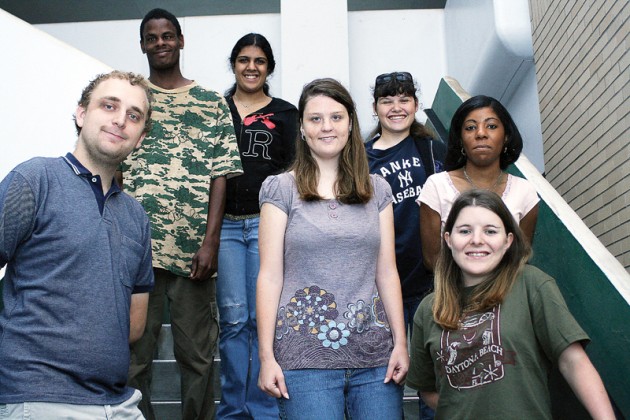Disabled students experience college through STAGES

For most high school seniors, graduation is the beginning of a new chapter in education. For members of the Exceptional Student Education program, graduation is usually the end of the book.
One program at USF is working to change that.
Successful Transition After Graduation for Exceptional Students (STAGES) is a transitional program that provides young adults with disabilities the opportunity to experience college life and gain job experience and training.
“Transition is a really critical part of special education because most of the research shows that students … don’t typically make good adult transitions,” said Ann Cranston-Gingras, USF special education professor. “Programs like this give students the opportunity to get a lot of support while they’re transitioning to adult kinds of activities.”
Throughout the two-year program, STAGES students work on enhancing their writing, math, communication, self-advocacy and social skills, said Gigi Gonzalez, the transition facilitator who oversees the program.
“I have seen growth in the students — their self-confidence is unbelievable,” she said. “I believe that STAGES is encouraging them to do things on their own and to be more independent.”
Gonzalez said STAGES allows the students to interact with college students who are doing essentially the same thing they are: searching for a job.
Real-world job experiences
One of the main focuses of the STAGES curriculum is enhancing the students’ employability skills, said Anne Wissner, coordinator of secondary transition programs for the Hillsborough County School District.
To help prepare them for future careers, Gonzalez said, the students participate in job training with various departments at USF such as Physical Plant, Dining Services, Aramark, Campus Recreation, the Sun Dome and human resources.
Through her training with the STAGES program, Erika Zaragoza, a recent STAGES graduate, assisted the USF women’s basketball team this season. Coach Jose Fernandez said the players welcomed Zaragoza as a member of the team.
“I think the STAGES program is a very great way to get these types of students and individuals out in the real world and work force,” he said.
Zaragoza said she will receive a championship ring in honor of the team’s Women’s National Invitation Tournament win. She said she is very proud of the team’s accomplishment and is excited to get her ring.
Three other STAGES graduates, Dana Brown, Traci Slaven and Sade Smartt all said they want to work with children. Gonzalez said the students worked at Pizzo Elementary School, the USF Patel Charter School and Bright Horizons, a day care center.
“I liked working with the little kids, taking their lunch out, playing with them, watching them outside,” Smartt said.
Several of the students also worked in the USF Library, shelving and transporting books, Gonzalez said.
“We look at STAGES students in the Library the way we would look at any student employee — everyone comes to us with a particular set of strengths and a particular set of skills,” said Mark Greenberg, director of special and digital collections at the USF Library.
Greenberg said Jonathan Stewart, a recent STAGES graduate who worked at the Library, performed work that was “absolutely critical” for the success of the special collections department. When the library received new books, Stewart made sure they were properly labeled and shelved.
Interacting with college students
STAGES is a School District of Hillsborough County (SDHC) transition program in partnership with the Department of Special Education in the College of Education,
Wissner said.
Cranston-Gingras, liaison to the STAGES program, said many friendships have developed between USF Department of Special Education students and the STAGES students. The two groups would often get lunch or do recreational activities together, she said. They also participated in a project for one of Cranston-Gingras’ classes.
Her special education students learned to appreciate the skills and experiences that the STAGES students had and saw how those skills helped the group, Cranston-Gingras said.
“They could see the STAGES students as peers at the same age level, looking at the challenges (the STAGES students) were facing in their lives in relation to what the USF students were facing in their lives,” she said. “(The USF students) saw a lot of overlap in terms of the kinds of decisions that you make when you’re 20 and 21 years old.”
Since 2005, USF medical students have met with STAGES students twice a month to discuss health care topics, Gonzalez said.
“The medical students (visiting) gives the STAGES students an opportunity to practice communicating their health concerns, advocating for themselves and being aware of their bodies and what they need,” she said.
Basics of the program
Seven students graduated from the STAGES program May 21, Gonzalez said. Since the
program began in 2004, a total of 32 students have graduated, she said.
STAGES is open to 18-21-year-olds who have graduated from high school with a special diploma, Wissner said. She said students do not pay to be in STAGES because the program is funded by SDHC.
Cranston-Gingras said having the STAGES program on campus benefits USF by adding a new dimension to the everyday life of the University.
“People on campus get a better picture of the kinds of strengths the students have,” she said. “People may have thought (the STAGES students) didn’t have the same potential as the other students. But they get to see what their potential really is and what kinds of things they contribute.”
For more information on the STAGES program and how to get involved contact Gigi Gonzalez at (813) 974-3632 or gonzalez@coedu.usf.edu.
Additional reporting by Yaffi Hilili.





